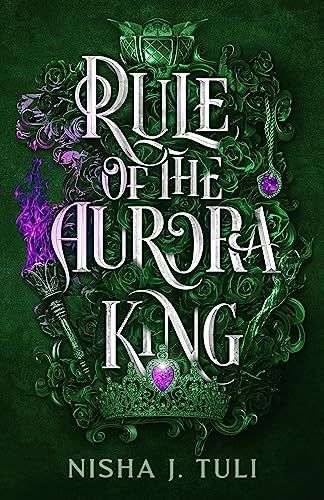We’ve had some issues with emails going to hotmail, outlook and related addresses. If you’ve recently made a purchase using one of these and not received a confirmation email, please get in contact with us – use an alterative email address for contact or purchase if you can.

For all things fantasy, horror, and speculative fiction
Announcement:

RULE OF THE AURORA KING
RULE OF THE AURORA KING by Nisha J. Tuli.
Orbit Books. p/b. £9.99.
Reviewed by Elloise Hopkins.

After all her ordeals in the Sun Queen Trials, it appears Lor has traded one prison for another, and after years of her imprisonment at his father’s hands, she now finds herself captive of the Aurora Prince. Does he want the same from her as Atlas did? Or even his father? Lor does not know, but she has strength, at least enough to keep her secrets. She will tell him nothing until she knows her brother and sister survived the prison riot on the day she was taken and are safe. There is one more thing playing on Lor’s mind. Why has the Aurora King not been to visit her since she returned to the kingdom?
Nadir is conflicted. Deceiving his father. Failing to find out why Atlas was so interested in Lor. She is proving to be the most infuriating puzzle he’s ever faced, yet Nadir cannot understand why his father locked her up in the first place. Nor can he understand why he is so drawn to her. She is only a mere human, after all.
Rule of the Aurora King grants Nadir a first-person point of view role in this instalment, allowing the reader a broader view of the key events, which are Lor’s continued exploration of who she is and her past and the developing relationship between these two primary characters.
In terms of who Lor is, without spoilers, in this second book, she is abruptly and openly very sure of her background, upbringing and the reason she was imprisoned by Nadir’s father. This is a sharp contrast to much of the first book, where Lor is portrayed as being innocent of her own story and entirely ignorant of the reason she ended up imprisoned. It is left to the reader to smooth over these contradictions and accept Lor’s new stance.
In terms of the narrative style and pace, this second in the series is very similar to the first, though we are granted some backstory chapters which provide a good insight into the reasons Atlas may have been interested in Lor. Worldbuilding is kept minimal, and Tuli has elevated the elements of erotic romance in the novel; crude expressions and expletives are heavily used in thought and dialogue to express character frustrations and emotions, leaving action to drive the narrative throughout. Readers will make up their own minds as to whether this style suits their preferred genre of romantic fantasy.